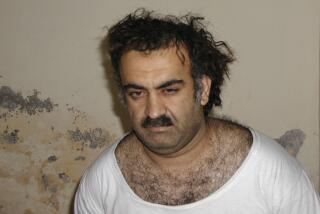Libyans Accused in Jet Bombing Meet U.S. Lawyer
WASHINGTON — Two Libyans accused of bombing Pan Am Flight 103 in December, 1988, have met in Tripoli with a leading Washington criminal defense attorney, a sign that Libya is taking steps that could bring them to trial in the United States.
Any break in the deadlock over Libya’s handing over the defendants, along with four other Libyans sought by the French for the 1989 bombing of a French airliner over the Sahara Desert, could lead to lifting the air embargo and other sanctions the U.N. Security Council imposed against Libya.
The two suspects met in Tripoli with defense attorney Plato Cacheris during a two-day period earlier this month. In an interview, Cacheris said that he sought to allay their fears of being tortured by U.S. authorities and that he explained the civil liberties guarantees that govern any trial here.
A State Department official said that despite Cacheris’ meetings, “We are very skeptical of any Libyan offer. They have made repeated offers in the past, since last November, and have never acted on them. We have seen no flexibility.”
On several occasions, Libyan leader Moammar Kadafi and other Libyan officials have indicated that they were ready to surrender the suspects to various intermediaries, but then they have either reneged or imposed conditions that were deemed unacceptable.
Cacheris, whose clients have included Watergate defendants, former National Security Council aide Oliver L. North’s secretary Fawn Hall and a prominent figure in the BCCI international banking scandal, said that he has not been officially retained to represent either man at this point.
The meeting was arranged by a Libyan businessman, he said, but he declined to identify him.
Cacheris also met with Libya’s minister of justice, Ibrahim Bakari, who Cacheris said expressed doubts that the two defendants, Abdel Basset Ali Megrahi and Lamen Khalifa Fhimah, could receive a fair trial, given the failure of a jury to convict four police officers in the Rodney G. King beating case in Los Angeles.
Bakari, according to Cacheris, maintained that Libyan law does not permit extradition of its citizens and said he would not encourage them to surrender to U.S. authorities. But he said that they could do so voluntarily and that his government would place no obstacles in their path.
In an indictment made public Nov. 14, 1991, the two were accused of 193 felony counts in the bombing of Flight 103, including three charges that carry the death penalty. They also were charged in Scotland with murder and conspiracy in blowing up the aircraft, which was en route from London to New York. The plane exploded over Lockerbie, Scotland, killing all 259 people aboard and 11 on the ground.
Cacheris said both suspects, who were accused of planting and detonating the bomb, claim they are innocent and deny they are Libyan agents. Libya also has denied involvement in the bombing.
U.S. officials, however, have identified the men as officers of Libya’s special Jamahiya Security Organization who flew from Libya to Malta as part of the plot.
Fhimah had recently worked for Libyan Arab Airlines and had access to the baggage tags of another airline, Air Malta, officials said. Using these tags, the two men allegedly were able to route a bomb-rigged suitcase as unaccompanied luggage, arranging for it to be placed in the Pan Am baggage system in Frankfurt, Germany.
Cacheris said the Libyans’ lawyer, Ibrahim Lagwell, sat in on the seven hours of meetings.
More to Read
Sign up for Essential California
The most important California stories and recommendations in your inbox every morning.
You may occasionally receive promotional content from the Los Angeles Times.










